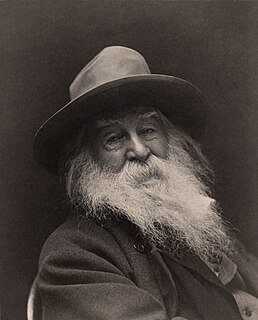
Walter Whitman was an American poet, essayist and journalist. A humanist, he was a part of the transition between transcendentalism and realism, incorporating both views in his works. Whitman is among the most influential poets in the American canon, often called the father of free verse. His work was controversial in its time, particularly his 1855 poetry collection Leaves of Grass, which was described as obscene for its overt sensuality. Whitman's own life came under scrutiny for his presumed homosexuality.
Year 1327 (MCCCXXVII) was a common year starting on Thursday of the Julian calendar.

Edward the Confessor was one of the last Anglo-Saxon English kings. Usually considered the last king of the House of Wessex, he ruled from 1042 to 1066.

Edward I, also known as Edward Longshanks and the Hammer of the Scots, was King of England from 1272 to 1307. Before his accession to the throne, he was commonly referred to as The Lord Edward. The first son of Henry III, Edward was involved from an early age in the political intrigues of his father's reign, which included an outright rebellion by the English barons. In 1259, he briefly sided with a baronial reform movement, supporting the Provisions of Oxford. After reconciliation with his father, however, he remained loyal throughout the subsequent armed conflict, known as the Second Barons' War. After the Battle of Lewes, Edward was hostage to the rebellious barons, but escaped after a few months and defeated the baronial leader Simon de Montfort at the Battle of Evesham in 1265. Within two years the rebellion was extinguished and, with England pacified, Edward joined the Ninth Crusade to the Holy Land. He was on his way home in 1272 when he was informed that his father had died. Making a slow return, he reached England in 1274 and was crowned at Westminster Abbey.
Walter Reynolds was Bishop of Worcester and then Archbishop of Canterbury (1313–1327) as well as Lord High Treasurer and Lord Chancellor.

Edward Mills Purcell was an American physicist who shared the 1952 Nobel Prize for Physics for his independent discovery of nuclear magnetic resonance in liquids and in solids. Nuclear magnetic resonance (NMR) has become widely used to study the molecular structure of pure materials and the composition of mixtures. Friends and colleagues knew him as Ed Purcell.

Wills Hill, 1st Marquess of Downshire,, known as The 2nd Viscount Hillsborough from 1742 to 1751 and as The 1st Earl of Hillsborough from 1751 to 1789, was a British politician of the Georgian era.

Edward Craggs-Eliot, 1st Baron Eliot was an English official and politician who sat in the House of Commons from 1748 to 1784 when he was raised to the peerage as Baron Eliot.

Eli Thayer was a member of the United States House of Representatives from 1857 to 1861. He was born in Mendon, Massachusetts. He graduated from Worcester Academy in 1840, from Brown University in 1845, and in 1848 founded Oread Institute, a school for young women in Worcester, Massachusetts. He is buried at Hope Cemetery, Worcester.

The Space Machine, subtitled A Scientific Romance, is a science fiction novel written by English writer Christopher Priest.
Martin Edward Reynolds is a former British track and field athlete who competed mainly in the 200 metres.

Crockham Hill is a village in the Sevenoaks district of Kent, England. It is about 3 miles (5 km) south of Westerham, and Chartwell is nearby. The village has a population of around 270 people. It contains a 19th-century pub, the Royal Oak, and Holy Trinity church.
Thomas Cobham was an English churchman, who was Archbishop-elect of Canterbury in 1313 and later Bishop of Worcester from 1317 to 1327.
Charles Herle (1598–1659) was a prominent English theologian, of moderate Presbyterian views.
Edward Rannell Reynolds is a retired National Football League (NFL) league office executive and American football linebacker who played in the NFL for the New England Patriots and New York Giants between 1983 and 1992. He played college football at the University of Virginia. Reynolds also served as an operations and training officer in the U.S. Army Reserve.

Edward Reynolds was a bishop of Norwich in the Church of England and an author. He was born in Holyrood parish in Southampton, the son of Augustine (Austin) Reynolds, one of the customers of the city, and his wife, Bridget.

Edward Burgess (1848–1891) was an American yacht designer. Several of his boats won fame in the waters of the eastern United States.
Thomas Reynolds was an English bishop and academic. He was the Warden of Merton College, Oxford, from 1545 and was created Bishop of Hereford by Mary I.

Edward Osmund Royle Reynolds, CBE, FRCP, FRCOG, FRCPCH, FMedSci, FRS, was a British paediatrician and Neonatologist who was most notable for the introduction of new techniques intended to improve the survival of newborns, especially those with respiratory failure, and for a series of papers regarding the value of techniques such as ultrasound imaging, nuclear magnetic resonance spectroscopy, and near infrared spectroscopy in determining the development and response to injury of the infant brain after birth.
Charles Reynolds was an Irish Catholic cleric, canonist, and diocesan administrator. Born in County Leitrim, son of Marcus MacRaghnaill, Reynolds entered a religious order and was appointed to influential posts as archdeacon and chaplain to the Earl of Kildare. His name in native Irish is Cathal Mac Raghnaill, but he anglicized his name to Charles Reynolds in order secure ecclesiastical benefices under English laws. He was educated at the University of Oxford and fluent in English, Irish, and Latin. Reynolds opposed Henry VIII of England's separation from the Catholic Church, declining to acknowledge him as Supreme Head of the Church of England and refusing to acknowledge the annulment of his marriage to Catherine of Aragon.











